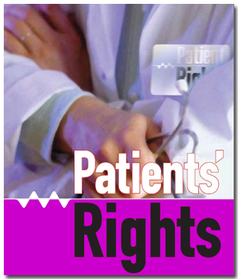CDUH QHA TRENT ACCREDITATION
PATIENT'S RIGHTS

- 1. The patient has the right to considerate and respectful care.
- 2. The patient has the right to know, by name, the physician responsible for coordinating his or her care.
- 3. The patient has the right to obtain from his or her physician complete current information about diagnosis, treatment, and prognosis in easily understandable terms. If it is medically inadvisable to give such information to the patients, it will be given to a legally authorized representative.
- 4. The patient has the right to receive from his physician information necessary to give informed consent prior to the start of any procedure and/or treatment. Except in emergencies this will include, but not necessarily be limited to, a description of the specific procedure or treatment, any risks involved, and the probable duration of any incapacitation. When there are alternatives to therapeutically designed research protocols, the patient has the right to know them. The patient also has the right to know the name of the person responsible for directing the procedures or treatment.
- The patient has the right to refuse to participate in research, to refuse treatment to the extent permitted by law, and has the right to be informed of the medical consequences of these actions including possible dismissal from the study and discharge from the institution. If discharge would jeopardize the patient’s health, he or she has the right to remain under CDUH care until discharge or transfer is medically advisable.
- The patient has the right to be transferred to another facility when his or her participation in the hospital study is terminated, providing the transfer is medically permissible, the patient has been informed of the needs for and alternatives to such a transfer, and the facility has agreed to accept the patient.
- The patient has the right to privacy concerning his own medical care program. Case discussion, consultation, examination and treatment are confidential and should be conducted discreetly; those not directly involved in his care must have the permission of the patient to be present. The patient has the right to expect that all communications and records pertaining to care should be treated as confidential to the extent permitted by law.
- The patient has the right to routine services whenever hospitalized at the hospital in connection with the active protocol for which he or she is eligible; these services will generally include diagnostic procedures and medical treatment deemed necessary and advisable by the professional staff. Complicating chronic conditions will be noted, reported to the patient, and treated as necessary without the assumption of long-term responsibility for their management. The patient may be returned for long term or definitive care of these conditions to the referring physician or to other appropriate medical resources.
- The patient has the right to expect that medical information about him or her discovered at the hospital, as well as an account of his or her medical program here, will be communicated to the referring physician.
- The patient has the right, at any time during the medical program, to designate physicians or organizations to receive medical updates. The patient should inform the Out-Patient Department of these additions.
- The patient has the right to know in advance what appointment times and physicians are available and where to go for continuity of care provided by the hospital when such care is required under the study for which the patient was admitted.
